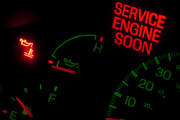Check Engine Light Diagnostic - Massachusetts

If you're a vehicle owner in Massachusetts, chances are you've experienced the dreaded check engine light at some point. This seemingly innocuous warning can cause anxiety and confusion, as it can indicate a range of potential issues with your vehicle. In this blog post, we'll explore the various reasons behind a check engine light warning, what you should do when faced with one, and the benefits of regular maintenance and seeking professional help. Let's dive in!
What Triggers a Check Engine Light Warning?
The check engine light is part of your vehicle's onboard diagnostic system, designed to alert you to potential problems. Here are some common issues that may trigger the warning:
- Loose or damaged gas cap: A missing or damaged gas cap can cause fuel vapors to escape, affecting your vehicle's emissions system and lowering its fuel efficiency.
- Faulty oxygen sensor: Oxygen sensors monitor the amount of unburned oxygen in your exhaust, helping your vehicle adjust its fuel mixture for optimal efficiency. A faulty sensor can lead to reduced fuel efficiency and increased emissions.
- Malfunctioning catalytic converter: The catalytic converter helps reduce harmful emissions by converting toxic gases into less harmful substances. If it malfunctions, your vehicle's performance and fuel efficiency may suffer, and you may fail an emissions test.
- Bad spark plugs or ignition coils: These components help ignite the fuel-air mixture in your engine. Worn or malfunctioning spark plugs or ignition coils can cause misfires, poor acceleration, and reduced fuel efficiency.
What to Do When Your Check Engine Light Comes On
When your check engine light comes on, it's essential not to panic. While some issues may be more severe than others, ignoring the warning can lead to further damage and costly repairs. Here's what you should do:
- Check for immediate issues: Look for any visible problems, such as steam coming from under the hood or unusual noises. If you notice any of these, pull over and call for assistance.
- Tighten your gas cap: A loose gas cap is an easy fix that may resolve the issue. Tighten it and wait a few drives to see if the light turns off.
- Visit a mechanic: If the light remains on after checking for visible issues and tightening your gas cap, it's time to consult a professional. They can use diagnostic tools to identify the problem and recommend the necessary repairs.
Don't wait until it's too late – get your check engine light diagnosed today!
Visit a trusted local auto repair shop!
Visit a trusted local auto repair shop!
The Benefits of Regular Maintenance and Seeking Professional Help
Keeping up with regular maintenance, such as oil changes, tire rotations, and fluid checks, can help prevent many issues that trigger check engine light warnings. By addressing minor problems before they escalate, you can save yourself time, money, and stress. Seeking professional help when faced with a check engine light warning ensures that you're getting accurate information and appropriate repairs. Mechanics have specialized tools and knowledge that enable them to diagnose and fix issues efficiently.
Tips for Preventative Vehicle Maintenance
Here are some tips to help reduce the likelihood of check engine light warnings and keep your vehicle running smoothly:
- Follow your vehicle's maintenance schedule: Consult your owner's manual for recommended maintenance intervals and stick to them.
- Check fluid levels regularly: Inspect your oil, coolant, power steering, brake, and transmission fluids routinely and top them off as needed.
- Replace filters and spark plugs: Replace your air filter, fuel filter, and spark plugs according to your vehicle's maintenance schedule.
- Monitor tire pressure: Check your tire pressure monthly and adjust as needed to maintain optimal fuel efficiency and handling.
Take Check Engine Light Warnings Seriously
While a check engine light warning may be daunting, it's crucial to address the issue promptly. Ignoring the warning can lead to more severe problems and expensive repairs down the line. By following a regular maintenance schedule and seeking professional help when needed, you can keep your vehicle in top shape and minimize the chances of encountering check engine light warnings. So, the next time you see that little light on your dashboard, take action – your vehicle (and wallet) will thank you!
